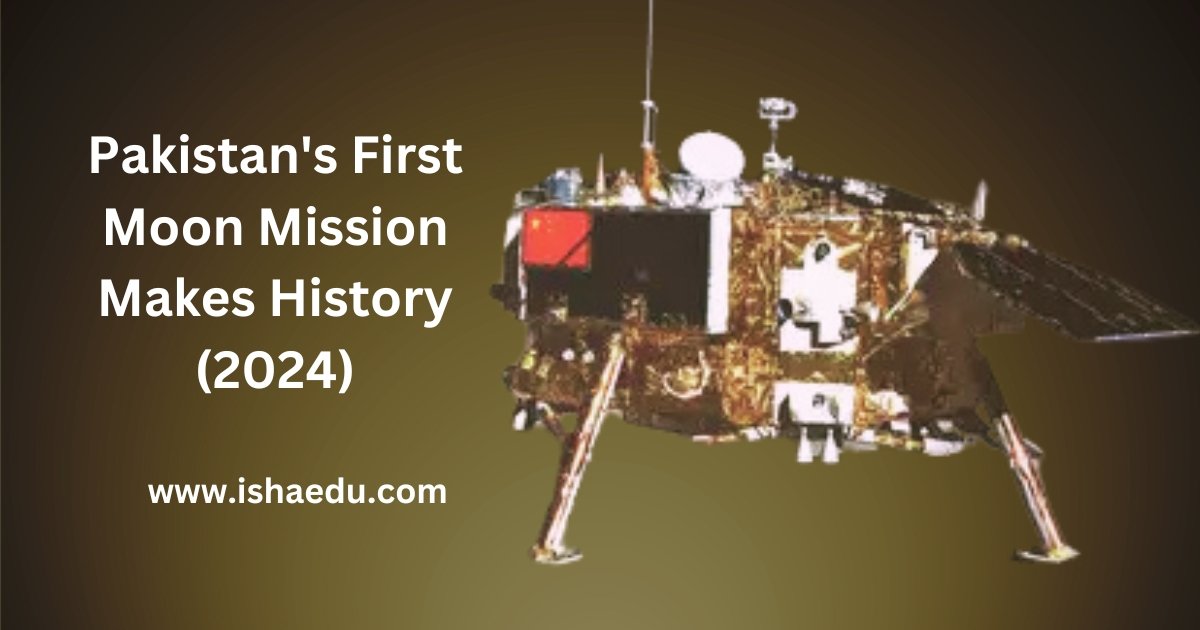Pakistan’s First Moon Mission Makes History (2024)

Pakistan’s First Moon Mission Makes History (2024)
In a significant stride forward for its space endeavors, Pakistan has triumphantly initiated its inaugural lunar mission in 2024, marking a monumental achievement for the nation’s space program. Dubbed iCUBE-Q, the mission stands as a collaborative venture with China’s Chang’e-6 lunar exploration initiative.
The iCUBE-Q mission showcases a pioneering utilization of CubeSat technology, epitomizing a new era in space exploration characterized by miniaturized satellites. These CubeSats, standardized and diminutive in size, are revolutionizing the landscape of space missions, democratizing access to space, and enabling participation even from smaller nations.
On May 3rd, 2024, iCUBE-Q commenced its journey aboard China’s Chang’e-6 probe, culminating in its successful deployment into lunar orbit on May 8th, 2024. This landmark mission represents a pivotal juncture in Pakistan’s space aspirations. Beyond the immediate scientific data and lunar imagery that iCUBE-Q promises to yield, the mission serves as a cornerstone for future Pakistani space ventures, showcasing the nation’s burgeoning proficiency in space technology and paving the way for forthcoming, intricate missions.
A Synopsis of Pakistan’s Maiden Lunar Expedition:
- Mission Name: iCUBE-Q
- Launch Date: May 3rd, 2024 (conducted in conjunction with China’s Chang’e-6 mission)
- Lunar Orbit Deployment: May 8th, 2024
- Mission Type: Lunar exploration utilizing a CubeSat platform
Unveiling Lunar Enigmas
The data amassed by iCUBE-Q holds the potential to significantly enhance our comprehension of the Moon. It stands to furnish invaluable insights into lunar geology, surface composition, and the spatial milieu surrounding the Moon. This reservoir of knowledge not only fuels scientific inquiry but also lays the groundwork for prospective lunar expeditions, whether aimed at further exploration or the establishment of a sustained human presence.
Of particular interest to scientists are the polar regions of the Moon, speculated to harbor ice reserves. These reserves bear the promise of serving as vital resources for future lunar habitation, furnishing potable water, and facilitating the production of rocket propellant. Understanding the magnitude and constitution of these ice deposits constitutes a paramount objective for lunar exploration, with iCUBE-Q’s findings poised to contribute substantially to this pursuit.
A Beacon of Global Collaboration
The significance of iCUBE-Q extends beyond its scientific contributions. The mission exemplifies the spirit of international cooperation in space exploration. Through collaborative endeavors, nations can pool resources and expertise, hastening our comprehension of the cosmos. Such collaborative ventures herald a future wherein scientists from across the globe collaborate to unravel the mysteries of the Moon and beyond.
The triumph of Pakistan’s inaugural lunar mission serves as a source of inspiration for burgeoning space programs in other developing nations. It underscores that, through collaboration and innovation, even nations with modest resources can assume pivotal roles in expanding the frontiers of space exploration. The trajectory of space exploration is poised to witness heightened international collaboration, with smaller nations assuming prominent roles alongside established spacefaring entities. This collective endeavor promises a more comprehensive and expeditious exploration of space, benefiting humanity at large.
Looking Ahead: Prospects for Pakistan’s Space Program
The success of iCUBE-Q represents a momentous stride forward for Pakistan’s space aspirations, poised to ignite the aspirations of future generations in the realms of science, technology, engineering, and mathematics (STEM). This impetus is imperative for the sustained evolution and progression of the nation’s space program.
Building upon the insights garnered from iCUBE-Q, Pakistan is poised to concentrate on the development of more sophisticated spacecraft in the ensuing years. These endeavors may encompass the integration of advanced scientific instrumentation or the deployment of robotic landers for detailed exploration of the lunar terrain. Additionally, Pakistan may explore avenues for collaboration with other spacefaring nations, embarking on ambitious missions such as crewed lunar expeditions.
One certainty emerges
Pakistan’s maiden lunar mission heralds the dawn of a new era in the nation’s exploration endeavors. The trajectory of Pakistan’s space program appears promising, and the global community awaits with anticipation to witness its forthcoming accomplishments.

FAQs
What is the mission to the Moon in 2024?
here are two planned missions to the Moon in 2024:
- China’s Chang’e-6 mission aims to collect lunar samples and return them to Earth for study.
- NASA’s Volatiles Investigating Polar Exploration Rover (VIPER) will be the first rover to explore the Moon’s south pole, searching for evidence of water ice.
Is Pakistan working on the Moon mission?
Yes, Pakistan successfully launched its first mission to the Moon in May 2024. It’s called iCUBE-Q and it’s a collaboration with China’s Chang’e-6 program. iCUBE-Q is a CubeSat, a small satellite that orbits the Moon and collects data.
What are the future moon missions?
Future moon missions will focus on returning humans to the Moon for sustained exploration, investigating resources like water ice, and involving more private companies. This will allow us to study the Moon in more detail and learn more about our place in space.
What is ICube Qamar?
iCUBE-Q is a Pakistani lunar mission launched in May 2024. It’s a small satellite studying the Moon.
Who made Icube Qamar?
The IceCube-Q lunar mission was a collaborative effort between:
- The Institute of Space Technology (IST) in Pakistan
- The Space and Upper Atmosphere Research Commission (SUPARCO), Pakistan’s national space agency
- Shanghai Jiao Tong University (SJTU) in China
Which country controls the Moon?
No country owns the Moon. There’s an international treaty, the Outer Space Treaty of 1967, that says all countries can explore it peacefully.
Why is the Moon red today in Pakistan?
The Moon wouldn’t appear red today in Pakistan. There isn’t a lunar eclipse today. The Moon can appear red during a lunar eclipse, but that’s not happening today.

پاکستان کا پہلا چاند کا مشن تاریخ رقماتا ہے (2024)
خلائی جدوجہد میں ایک اہم پیش رفت کے طور پر، پاکستان نے 2024ء میں اپنے پہلے چاند کے مشن کا باوقار آغاز کیا، جو اس کے خلائی پروگرام کے لیے ایک یادگار ھی ہے۔ “آئی کیوب-کاف” کے نام سے موسوم یہ مشن، چین کے چانگ ای-6 چاند کی دریافت کی کوششوں کے ساتھ ایک مشترکہ منصوبہ ہے۔
آئی کیوب-کاف مشن کیوب سیٹ ٹیکنالوجی کے ابتدائی استعمال کو ظاہر کرتا ہے، جو خلائی سفر کے نئے دور کی علامت ہے جس کی خصوصیت چھوٹے سیٹلائٹ ہیں۔ یہ کیوب سیٹ، جو معیاری اور سائز میں چھوٹے ہوتے ہیں، خلائی مشنوں کے منظرنامے میں انقلابرہے ہیں، خلا میں رسائی کو آسان بنا رہے ہیں اور چھوٹے ممالک کو بھی اس میں شرکت کی اجازت دے رہے ہیں۔
3 مئی 2024ء کو، آئی کیوب-کاف نے چین کے چانگ ای-6 خلائی جہاز کے ساتھ اپنا سفر شروع کیا اور 8 مئی 2024ء کو چاند کے مدار میں کامیابی سے داخل ہو گیا۔ یہ سنگ میل مشن پاکستان کی خلائی خواہشات میں ایک اہم موڑ کی نمائندگی کرتا ہے۔ سائنسی اعداد و شمار اور چاند کی تصاویر حاصل کرنے کے علاوہ، جو آئی کیوب-کاف فراہم کرنے کا وعدہ کرتا ہے، یہ مشن مستقبل کے پاکستانی خلائی منصوبوں کے لیے ایک بنیاد کے طور پر کام کرتا ہے، جو خلائی ٹیکنالوجی میں ملک کی ابھرتی ہوئی مہارت کو ظاہر کرتا ہے اور آنے والے پیچیدہ مشنوں کے لیے راستہ ہموار کرتا ہے۔
پاکستان کے پہلے چاند کے سفر کا خلاصہ
مشن کا نام: آئی کیوب-کاف
لانچ کی تاریخ: 3 مئی 2024ء (چین کے چانگ ای-6 مشن کے ساتھ مل کر)
چاند کے مدار میں داخل ہونے کی تاریخ: 8 مئی 2024ء
مشن کی قسم: کیوب سیٹ پلیٹ فارم کا استعمال کرتے ہوئے چاند کی دریافت
چاند کے رازوں سے پردہ اٹھانا
آئی کیوب-کاف کے جمع کیے گئے اعداد و شمار چاند کے بارے میں ہماری سمجھ کو بہت بڑھانے کی صلاحیت رکھتے ہیں۔ یہ چاند کے جغرافیہ، سطح کے اجزاء اور چاند کے آس پاس کے خلائی ماحول کے بارے میں قیمتی بصیرت فراہم کرے گا۔ یہ علم نہ صرف سائنسی تحقیق کو آگے بڑھاتا ہے بلکہ چاند کی مزید دریافت یا وہاں مستقل انسانی موجودگی کے قیام کے لیے بھی منصوبہ بندی کی بنیاد رکھتا ہے۔
سائنسدانوں کی خاص دلچسپی چاند کے قطبی علاقوں میں ہے، جہاں برف کے ذخائر ہونے کا امکان ہے۔ یہ ذخائر مستقبل میں چاند پر رہائش کے لیے ضروری وسائل، صاف پانی کی فراہمی اور راکٹ پروپیلنٹ کی پیداوار میں مدد کرنے کا وعدہ کرتے ہیں۔ ان برف کے ذخائر کی مقدار اور ساخت کو سمجھنا چاند کی دریافت کا ایک اہم مقصد ہے، اور آئی کیوب-کاف کی نتائج اس کوشش میں نمایاں طور پر حصہ ڈالنے کے لیے تیار ہیں۔
عالمی تعاون کا ایک مینارہ نور
آئی کیوب-کاف کی اہمیت اس کے سائنسی تعاون سے آگے ہے۔ یہ مشن خلائی سفر میں بین الاقوامی تعاون کی روح کی عکاسی کرتا ہے۔ مشترکہ کوششوں کے ذریعے، ممالک وسائل اور مہارت کو اکٹھا کر سکتے ہیں، جس سے کائنات کے بارے میں ہماری سمجھ تیز ہوتی ہے۔ ایسے مشترکہ منصوبے مستقبل کی نشاندہی کرتے ہیں جہاں دنیا بھر کے سائنسدان چاند اور اس سے آگے کے رازوں کو جاننے کے لیے
2024 میں چاند کا مشن کیا ہے؟
2024 میں چاند پر جانے کے لیے دو منصوبے بنائے گئے ہیں:
چین کا چانگ ای-6 کا مقصد چاند کے نمونے جمع کرنا اور انہیں زمین پر واپس لانا ہے تاکہ ان کا مطالعہ کیا جا سکے۔
ناسا کا وولٹائلز انویسٹیگیٹنگ پولر ایکسپلوئریشن روور (VIPER) چاند کے جنوبی قطب کی کھوج کرنے والا پہلا روور ہوگا، جو پانی کی برف کے ثبوت کی تلاش کر رہا ہے۔
کیا پاکستان چاند کے مشن پر کام کر رہا ہے؟
جی ہاں، پاکستان نے مئی 2024 میں چاند پر اپنا پہلا مشن کامیابی سے لانچ کیا ہے۔ اسے آئی کیوب-کاف کہتے ہیں اور یہ چین کے چانگ ای-6 پروگرام کے ساتھ ایک مشترکہ منصوبہ ہے۔ آئی کیوب-کاف ایک کیوب سیٹ ہے، جو چاند کے گرد مدار میں گردش کرتا ہے اور ڈیٹا جمع کرتا ہے۔
مستقبل کے چاند کے مشن کیا ہیں؟
مستقبل کے چاند کے مشن انسانوں کو مستقل طور پر چاند پر واپسی، پانی کی برف جیسے وسائل کی تحقیق، اور مزید نجی کمپنیوں کو شامل کرنے پر توجہ مرکوز کریں گے۔ یہ ہمیں چاند کا زیادہ تفصیل سے مطالعہ کرنے اور خلا میں اپنی جگہ کے بارے میں مزید جاننے کی اجازت دے گا۔
آئی کیوب قمر کیا ہے؟
iCUBE-Q ایک پاکستانی خلائی جہاز ہے جسے مئی 2024 میں لانچ کیا گیا تھا۔ یہ چاند کا مطالعہ کرنے والا ایک چھوٹا سیٹلائٹ ہے۔
آئی کیوب قمر کس نے بنایا؟
IceCube-Q چاند کا مشن ان اداروں کے درمیان مشترکہ کوشش تھی:
پاکستان میں انسٹی ٹیوٹ آف سپیس ٹیکنالوجی (IST)
پاکستان کی قومی خلائی ایجنسی، سپیس اینڈ اپپر ایٹموسفیئر ریسرچ کمیشن (SUPARCO)
چین کی شنگھائی جیاو ٹانگ یونیورسٹی (SJTU)
چاند پر کس ملک کا کنٹرول ہے؟
چاند کسی ملک کی ملکیت نہیں ہے۔ ایک بین الاقوامی معاہدہ، 1967 کا آؤٹر اسپیس ٹریٹی، کہتا ہے کہ تمام ممالک اسے پرامن طور پر دریافت کر سکتے ہیں۔

Join Us :
Click Here To Get Technology And Entertainment Notification:





Very informative.